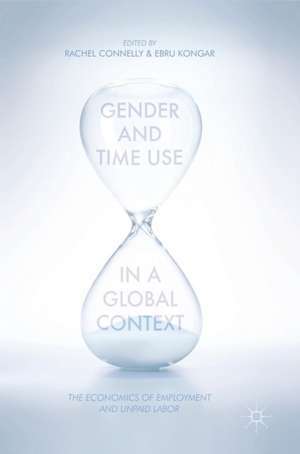Gender and Time Use in a Global Context: The Economics of Employment and Unpaid Labor
Editat de Rachel Connelly, Ebru Kongaren Limba Engleză Hardback – 10 iul 2017
Preț: 957.13 lei
Preț vechi: 1167.23 lei
-18% Nou
Puncte Express: 1436
Preț estimativ în valută:
183.15€ • 192.10$ • 152.47£
183.15€ • 192.10$ • 152.47£
Carte tipărită la comandă
Livrare economică 01-15 aprilie
Preluare comenzi: 021 569.72.76
Specificații
ISBN-13: 9781137568366
ISBN-10: 1137568364
Pagini: 408
Ilustrații: XXIII, 505 p. 24 illus.
Dimensiuni: 148 x 210 mm
Greutate: 0.78 kg
Ediția:1st ed. 2017
Editura: Palgrave Macmillan US
Colecția Palgrave Macmillan
Locul publicării:New York, United States
ISBN-10: 1137568364
Pagini: 408
Ilustrații: XXIII, 505 p. 24 illus.
Dimensiuni: 148 x 210 mm
Greutate: 0.78 kg
Ediția:1st ed. 2017
Editura: Palgrave Macmillan US
Colecția Palgrave Macmillan
Locul publicării:New York, United States
Cuprins
1. Feminist Approaches to Time Use; Rachel Connelly and Ebru Kongar
PART I: Gender, Time Use, and the Macroeconomy
2. Unpaid Work in Macroeconomics: A Stocktaking Exercise; İpek İlkkaracan
3. The Challenge of Austerity For Gender Equality In Europe; Maria Karamessini, Jill Rubery
4. Women, Recession, and Austerity; Lourdes Benería
5. Paid and Unpaid Work Time by Labor Force Status of Prime Age Women and Men in Canada; Fiona MacPhail
6. Gender, Socieconomic Status, Time-Use, and the Great Recession in the U.S.; Ebru Kongar, Mark Price
7. Time and Income Poverty in the Case of Buenos Aires; Rania Antonopoulos, Valeria Esquivel, Thomas Masterson, Ajit Zacharias
8. The Dual Problem of Unemployment and Time Poverty in South Africa; Maria Sagrario Floro, Abhilasha Srivastava
9. Women and the Urban Economy in India; Smriti Rao
PART II: The Microeconomics of Gendered Time Use - The Intersectionality of Care Work, Labor Market Work, and Housework
10. The Challenge of “Indirect Care”; Julie Nelson
11. Caregiving by Older Adults in the United States; Charlene Kalenkoski12. Division of Workforce and Domestic Labor among Same-Sex Couples; Esther Rothblum
13. Double Shift, Double Balance: Housework in the Presence of Children in the United States; Deborah S. DeGraff, Rebecca Centanni
14. How Do Caregiving Responsibilities Shape the Time Use of Women and Men in Rural China?; Margaret Maurer-Fazio, Rachel Connelly
15. Gendered Patterns of Time Use over the Life Cycle in Turkey; Ebru Kongar, Emel Memiş
16. Environmental Chores, Household Time Use, and Gender in Rural Tanzania; Deborah S. DeGraff, Deborah Levison, Esther W. Dungumaro
17. Gender Divisions in the Real Time of the Elderly in South Africa; Dorrit Posel, Erofili Grapsa
18. Is it Just Too Hard? Gender Time Symmetry in Market and Nonmarket Work and Subjective Time Pressure in Australia, Finland, and Korea; Lyn Craig, Judith E. Brown, Lyndall Strazdins, Jiweon Jun
Notă biografică
Rachel Connelly is the Bion R. Cram Professor of Economics at Bowdoin College, USA. Her recent research examines time use in the US, particularly as it relates to child caregiving, and the relationships between family structure, age, migration, and time use in China. She is an Associate Editor of Feminist Economics.
Ebru Kongar is Associate Professor of Economics at Dickinson College, USA. Her research focuses on the gendered time use and labor market outcomes of macroeconomic developments, such as deindustrialization, offshoring, and the Great Recession in the US economy. She is an Associate Editor of Feminist Economics.
Contributor Affiliations:
Rania Antonopoulos, Alternate Minister for Labour, Greece; Levy Economics Institute, USA
Lourdes Benería, Cornell University, USA
Judith E. Brown, University of New South Wales, Australia
Rebecca M. Centanni, Analysis Group, Boston, USA
Lyn Craig, University of New South Wales, Australia
Deborah S. DeGraff, Bowdoin College, USA
Esther W. Dungumaro, University of Dar es Salaam, Tanzania
Valeria Esquivel, Food and Agriculture Organization of the United Nations
Maria S. Floro, American University, USA
Erofili Grapsa, Rhodes University, South Africa
İpek İlkkaracan, Istanbul Technical University, Turkey
Jiweon Jun, University of Oxford, UK
Charlene Kalenkoski, Texas Tech University, USA
Deborah Levison, University of Minnesota, USA
Fiona MacPhail, University of Northern British Columbia, Canada
Thomas Masterson, Levy Economics Institute, USA
Margaret Maurer-Fazio, Bates College, USA
Emel Memiş, Ankara University, Turkey
Julie A. Nelson, University of Massachusetts Boston, USA
Dorrit Posel, University of the Witwatersrand, South Africa
Mark Price, Keystone Research Center, USASmriti Rao, Assumption College, USA
Esther D. Rothblum, San Diego State University, USA
Jill Rubery, European Work and Employment Research Centre, UK
Abhilasha Srivastava, American University, USA
Lyndall Strazdins, The Australian National University, Australia
Ajit Zacharias, Levy Economics Institute, USA
Textul de pe ultima copertă
This edited volume uses a feminist approach to explore the economic implications of the complex interrelationship between gender and time use. Household composition, sexuality, migration patterns, income levels, and race/ethnicity are all considered as important factors that interact with gender and time use patterns. The book is split in two sections: The macroeconomic portion explores cutting edge issues such as time poverty and its relationship to income poverty, and the macroeconomic effects of recession and austerity; while the microeconomic section studies topics such as differences by age, activity sequencing, and subjective well-being of time spent. The chapters also examine a range of age groups, from the labor of school-age children to elderly caregivers, and analyze time use in Argentina, Australia, Canada, China, Finland, India, Korea, South Africa, Tanzania, Turkey, and the United States. Each chapter provides a substantial introduction to the academic literature of its focus and is written to be revealing to researchers and accessible to students and policymakers.
Caracteristici
Contributes gender-nuanced studies of micro- and macroeconomic topics
Provides empirical analysis from over ten countries
Explores intersectional issues, particularly age
Provides empirical analysis from over ten countries
Explores intersectional issues, particularly age








